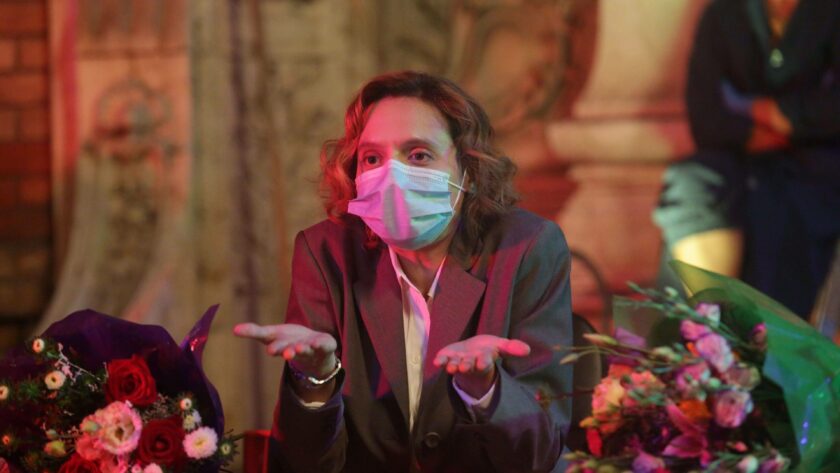Anna Ainio reviews the Golden Bear winner, a satirical look at society’s views toward prejudice and publicity.
In 2021, one should know what the word ‘revenge porn’ means: the illicit distribution of pornographic videos on the internet. Indeed, this is something that in Western society, is condemned. And indeed, some laws regulate it. But law and morality are two barely overlapping spheres, and whereas the law doesn’t judge whoever is the victim of this offence, moralism (morality’s degeneration) is there to fill this gap. Thus – and it happens every day – when a public figure is compromised by this offence, people’s concern most of the time isn’t to condemn those who put the video online, as to malevolently speculate on the whys and hows of the nature of the video. These speculations grow bigger and larger until their undertones become explicit: ‘why did they do that video in the first place?’, ‘Isn’t it something that shouldn’t be done?’ , ‘there’s something gross and loathsome about shooting a porn video’ etc.

These murmurs are the topic of Radu Jude’s new film Bad Luck Banging or Loony Porn, winner of the Golden Bear at the 2021 Berlin International Film Festival. Shot during the global pandemic, Jude’s film is an intense, kitsch social satire. The story of a schoolteacher Emi (Katia Pascariu), whose sex tape ends up online, the film’s title is as perfectly explicit as the content of its first ten minutes. But Jude seems to suggest, not just those ten minutes (where we are shown the tape), but the rest of the film is equally – if not more – shocking. After the introduction, the film begins with its first part: Katia walking in Bucharest. The city’s squalor is enhanced by Jadu’s shots that seem – intentionally or not – to emulate those of an amatorial sex tape. Curiously, the camera frequently indulges in decadent old buildings that are the only material in this film that allows for metaphoric thinking. Otherwise, Emi’s promenade is just a pointless voyage populated by pedestrians shouting at one another in the street, in the supermarket, in the pharmacy… The second part is a collection of short shots, each one with its title. Ranging from ‘Ceaușescu’ to ‘Blowjob’, they are a pastiche of clips, some explicitly highly critical of Romanian politics, others randomly quoting figures such as Walter Benjamin or Virginia Woolf. As a result, while one is still thinking about the link between the title and the clip, the next one is showing. So, for the sake of being present, one gives up and just stares at the absurdity. Though this, to me, must be what the director was aiming to. It could be a matter of discussion whether this makes sense.
In the third part, we are brought back to Bucharest. Emi is on trial at her school. In a courtyard infused pink and green neon lightning, her case is examined by a jury of ignorant, loudmouth parents. At the same time, the cleaning lady wipes an Eminescu statue in the background. The term grotesque is reductive to describe this scene. Indeed, it’s not just the racism, male chauvinism and anti-semitism of Emi’s accusers, but the intermixing of anti-logical argumentations with Edgar Lee Masters, Hannah Arendt and Freud’s quotes. The atmosphere of the scene is made tenser through shouts of ‘Please, maintain social distancing rules’ as Emi fights another woman.

I get it. There are things we consider ordinary but instead, should shock us. Why don’t capitalism and consumerism’s absurdities shock us? Society’s hypocrisy is obscene, not porn tapes. But this film is perfect proof of it. Indeed, one can understand, perhaps agree with Jude’s argument. But, in my view, the nearly forty minutes of randomly assembled videos in Part II does not add much to it. Perhaps this is precisely the point: through the tapes, the film shows the superabundance, the waste of capitalism devoid of any meaning. However, embedded in this lies the risk for the film to become a tool of that system. That is, by showing the pointlessness and absurdity, this film is adding onto that absurdity. It portrays the ruins of a society and its hypocrisy, bringing everything (poetry, sex, literature, politics) down with it. Everything is a waste, it seems to argue. But this becomes a technique to legitimate the mechanism, not so much a critique of it. ‘We only kept you for a moment’, a caption reads at the end of the film. The upfront irony is what makes this film worth watching. But in sum, although it is undoubtedly an important testimony of our times, Radu Jude’s film is not the masterpiece some think it is.




